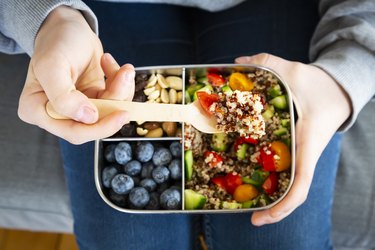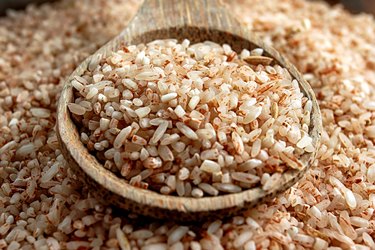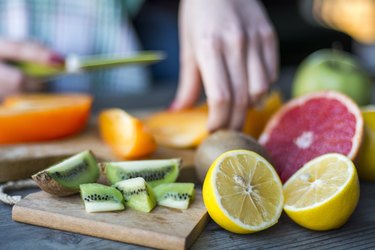
Ask almost anyone about their New Year's resolutions and chances are good that "eating healthy" is near the top of the list. But while some people opt to overhaul their diets completely at the start of the year, making small behavioral changes you're more likely to stick with could do more to improve your health in the long run.
In that spirit, we polled registered dietitians to get their take on the small, sustainable changes anyone can make to improve their diet, along with tips and tricks to help implement them. Below are their top five responses.
Video of the Day
Video of the Day
1. Eat More Fruits and Veggies

It's no great surprise that fruits and vegetables are good for your health: According to Harvard's T.H. Chan School of Public Health, a diet rich in a variety of both can prevent diseases like cancer, stroke and diabetes.
Unfortunately, a November 2017 report from the Centers for Disease Control and Prevention found that only 1 in 10 Americans are getting the recommended daily serving of these powerhouse foods (that's 1.5 to 2 cups per day of fruit and 2 to 3 cups of veggies).
Jenna Appel, RD, dietitian and owner of Appel Nutrition Inc., recommends changing the layout of your plate so that half is made up entirely of fruits and veggies. If half a plate is too daunting, focus instead on putting a variety of colors — at least three — on your plate to give your body a healthy mix of different nutrients.
2. Stop Thinking of Carbs as the Enemy

According to dietitian Rachel Fine, RD, owner of To the Pointe Nutrition, when clients want to lose weight or eat healthier, foods that contain carbohydrates are some of the first to go (looking at you, keto diet). But Fine says this macronutrient plays an important role in our health and shouldn't be shunned.
"Carbs are critical for the body because they provide the most efficient form of fuel, especially for exercise," she says.
According to the Mayo Clinic, carbohydrates should make up anywhere from 45 to 65 percent of your total daily calories.
The key is choosing the right carbs. In addition to half a plate of fruits and vegetables, structure your meals so that a quarter of the plate contains unprocessed, whole grains like brown rice, quinoa or farro.
3. Skip the Day-After Cleanse

Despite what some diets would have you believe, our bodies are naturally designed to manage their own detoxing — no juicing required.
"From the liver and skin to our intestines, we are metabolically wired to naturally excrete waste that builds from both natural metabolism and from our environment," says Fine. "Detox diets also wreak havoc on your metabolism by introducing a cycle of undereating and then overeating."
Instead, promote your body's own natural cleansing by eating foods that promote natural liver and kidney function, such as dandelion greens, artichokes and grapefruit. And of course, remember to drink lots of water, since adequate hydration helps every organ in your body perform at its best — more on that next.
Read more: 5 Things to Do Instead of Detoxing After a Big Meal
4. Stay Hydrated

Water is pretty much the best tool in your arsenal if you want to get healthy: Not only can it clear your skin, help you lose weight and help carry nutrients and oxygen to your cells, a January 2019 review in the journal Nutrients says it can also cure fatigue, improve cognition and improve your mood.
Drinking the recommended amount, however — about eight 8-ounce glasses each day — can be a challenge.
"Challenge yourself to have at least one glass of water upon waking," suggests dietitian Brittany Modell, RD. And aim to down two more glasses before each meal. One trial that included 84 people, published August 2015 in Obesity, found that those who did so lost more weight than those who didn't, likely because the added liquid helped suppress their appetite.
To add a little variety to your H2O, "squeeze in some lemon, add a drop of apple cider vinegar or include sliced cucumbers to jazz it up," Modell says.
5. Treat Yourself

Sugar fiends, rejoice! While eating too much refined sugar can contribute to diseases like diabetes and cancer, denying yourself of any kind of sugary treat only leads to overeating, Fine says.
"When sweets are labeled as 'bad' and placed on the 'forbidden' list, we subconsciously want them. But once we grant ourselves unconditional permissions to eat our favorite foods, we relieve the weight of responsibility that these foods hold over us," she says.
Pro tip: Dedicate a few hours to batch-cooking and stock the fridge with treats that provide nutrients as well as natural sources of sugar, such as homemade sorbet or chocolate almond balls. This way, when you reach for a treat (and you will), you're not spiking your blood sugar or totally derailing your healthy-eating goals.
- Harvard T.H. Chan School of Public Health: "Vegetables and Fruits"
- Centers for Disease Control and Prevention: "Only 1 in 10 Adults Get Enough Fruits or Vegetables"
- Mayo Clinic: "Nutrition and Healthy Eating"
- Nutrients: "Narrative Review of Hydration and Selected Health Outcomes in the General Population"
Was this article helpful?
150 Characters Max
0/150
Thank you for sharing!
Thank you for your feedback!